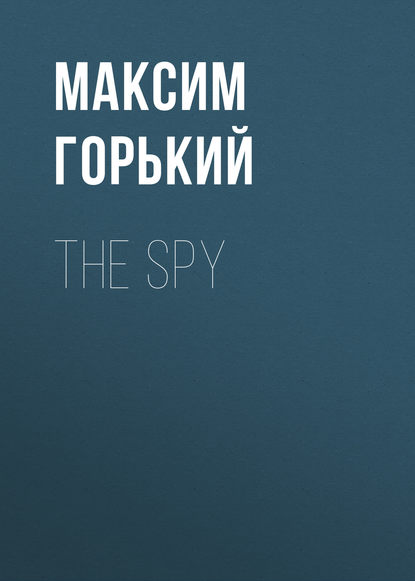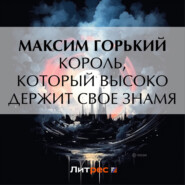По всем вопросам обращайтесь на: info@litportal.ru
(©) 2003-2024.
✖
The Spy
Настройки чтения
Размер шрифта
Высота строк
Поля
"They say the Japs arranged the affair."
"S-s-s-o?" the cook cried ironically. "The Japs, the Japs, of course! We know the Japs. They keep to themselves, they stick in their own home. Our master explained to us who they are. You just tell my brother about the Japs. He knows all about them, too. It was scoundrels, not Japs!"
From what Melnikov had said Yevsey knew that the cook's brother Matvey Zimin worked in a furniture factory, and read prohibited books. Now, all of a sudden, he was seized with the desire to tell her that the police knew about Zimin's infidelity to the Czar. But at that minute Masha jumped down from the bed, and cried out while arranging her hair:
"Of course, they have no way of justifying themselves, so they hit upon the Japs as an excuse."
"The blackguards!" drawled the cook. "Yesterday in the market somebody also made a speech about the Japs. Evidently he had been bribed to justify the officials. One old man was listening, and then you should have heard what he said about the generals, about the ministers, and even about the Czar himself. How he could do it without putting the least check upon himself – no, you can't fool the people. They'll catch the truth, no matter into what corner you drive it."
Klimkov looked at the floor, and was silent. The desire to tell the cook that watch was being kept upon her brother now left him. He involuntarily thought that every person killed had relatives, who were now just as puzzled as Masha and Anfisa, and asked one another "Why?" He realized that they were crying and grieving in dark perplexity, with hatred secretly springing up in their hearts, hatred of the murderers and of those who endeavored to justify the crime. He sighed and said:
"A horrible deed has been done." At the same time he thought: "But I, too, am compelled to protect the officials."
Masha giving the door to the kitchen a push with her foot, Yevsey remained alone with the cook, who looked at the door sidewise, and grumbled:
"The woman is killing herself. Even her milk is spoiled. This is the third day she hasn't given nourishment. See here, Thursday next week is her birthday, and I'll celebrate my birthday then, too. Suppose you come here as a guest, and make her a present, say, of a good string of beads. You must comfort a person some way or other."
"Very well. I'll come."
"All right."
Klimkov walked off slowly, revolving in his mind what the women had said to him. The cook's talk was too noisy, too forward, instantly creating the impression that she did not speak her own sentiments, but echoed those of another. As for Masha, her grief did not touch him. He had no relatives, moreover he rarely experienced pity for people. Nevertheless he felt that the general revolt everywhere noticeable was reflected in the outcries of these women, and – the main thing – that such talk was unusual, inhumanly brave. Yevsey had his own explanation of the event: fear pushed people one against the other. Then those who were armed and had lost their senses exterminated those who were unarmed and foolish. But this explanation did not stand firm in Yevsey's mind, and failed to calm his soul. He clearly realized from what he had seen and heard that the people were beginning to free themselves from the thralldom of fear, and were insistently and fearlessly seeking the guilty, whom they found and judged. Everywhere large quantities of leaflets appeared, in which the revolutionists described the bloody days in St. Petersburg, and cursed the Czar, and urged the people not to believe in the administration. Yevsey read a few such leaflets. Though their language was unintelligible to him, he sensed something dangerous in them, something that irresistibly made its way into his heart, and filled him with fresh alarm. He resolved not to read any leaflets again.
Strict orders were given to find the printing office in which the leaflets were printed, and to catch the persons who distributed them. Sasha swore, and even gave Viekov a slap in the face for something he had done. Filip Filippovich invited the agents to come to him in the evenings, in order to deliver speeches to them. He usually sat in the middle of the room behind his desk, resting the lower half of his arms upon it, and keeping his long fingers engaged in quietly toying with the pencils, pens, and papers. The various gems on his hands sparkled in different colors. From under his black beard gleamed a large yellow medal. He moved his short neck slowly, and his blue spectacles rested in turn upon the faces of all present, who meekly and silently sat against the wall. He scarcely ever rose from his armchair. Nothing but his fingers and his neck moved. His heavy face, bloated and white, looked like a face in a portrait; the hairs of his beard seemed glued together. When silent, he was calm and staid, but the instant he spoke in his thin voice, which screeched like an iron saw while being filed, everything about him, the black frockcoat and the order, the gems, and the beard, seemed to be stuck upon somebody else. Sometimes Yevsey fancied that an artificial puppet sat in front of him, inside of which was hidden a little shrivelled-up fellow, resembling a little red devil. If someone were to shout at the puppet, he imagined, the little devil would be frightened, and would jump out with a squeak, and leap through the window.
Nevertheless Yevsey was afraid of Filip Filippovich. In order not to attract to himself the gobbling look of his blue glasses, he sat as far as possible from him, trying the entire time not to move.
"Gentlemen," the thin voice trembled in the air. It drove against Yevsey's breast unpleasantly and coldly, like a gleaming steel rod. "Gentlemen, you must listen to me carefully. You must remember my words. In these days everyone of you should put your entire mind, your entire soul, into the war with the secret and cunning enemy. You should listen to your orders and fulfil them strictly, though you may act on your own initiative, too. In the secret war for the life of your mother Russia, you must know, all means are permissible. The revolutionists are not squeamish as to the means they employ; they do not stop at murder. Remember how many of your comrades have perished at their hands. I do not tell you to kill. No, of course not. I cannot advise such measures. To kill a man requires no cleverness. Every fool can kill. Yet the law is with you. You go against the lawless. It would be criminal to be merciful toward them. They must be rooted out like noxious weeds. I say, you must for yourselves find out what is the best way to stifle the rising revolution. It isn't I who demand this of you; it is the Czar and the country." After a pause during which he examined his rings, he went on. "You, gentlemen, have too little energy, too little love for your honest calling. For instance, you have let the old revolutionist Saydakov slip. I now know that he lived in our city for three and a half months. Secondly, up to this time you have failed to find the printing office."
"Without provocators it is hard," someone ventured in an offended tone.
"Don't interrupt, if you please. I myself know what is hard, and what is easy. Up to this time you have not been able to gather serious evidence against a whole lot of people known for their seditious tendencies, and you cannot give me any grounds for their arrest."
"Arrest them without grounds," said Piotr with a laugh.
"What is the object of your facetiousness? I am speaking seriously. If you were to arrest them without grounds, we should simply have to let them go again. That's all. And to you personally, Piotr Petrovich, I want to remark that you promised something a long time ago. Do you remember? You likewise, Krasavin. You said you had succeeded in becoming acquainted with a man who might lead you to the Terrorists. Well, and what has come of it?"
"He turned out to be a cheat. You just wait. I'll do my business," Krasavin answered calmly.
"I have no doubt of it whatsoever, but I beg all of you to understand that we must work more energetically, we must hurry matters up."
Filip Filippovich discoursed a long time, sometimes a whole hour, without taking breath, calmly, in the same level tone. The only words that varied the monotonous flow were "You must." The "you" came out resonantly like a long-drawn hammer-blow, the "must," in a drawled hiss. He embraced everybody in his glassy blue look. His words fairly choked Yevsey.
Once at the end of a meeting, when Sasha and Yevsey were the only ones who remained with Filip Filippovich, Yevsey heard the following colloquy:
Filip Filippovich (glumly, dejectedly): What idiots they are, though!
Sasha (snuffling): Aha!
Filip Filippovich: Yes, yes, what can they do?
Sasha: It seems that now you are going to learn the value of decent people.
Filip Filippovich: Well, give them to me. Give them to me.
Sasha: Ah, they cost dear!
Klimkov was neither surprised nor offended. This was not the first time he had heard the authorities swear at their subordinates. He counted it in the regular order of life.
The spies after the meetings spoke to one another thus:
"Um, yes, a converted Jew, and just look at him!"
"They say he got a raise of 600 rubles the first of the year."
"The value of our labor is growing."
Sometimes a handsome, richly dressed gentleman by the name of Leontyev addressed the spies in place of Filip Filippovich. He did not remain seated, but walked up and down the room holding his hands in his pockets, politely stepping out of everybody's way. His smooth face, always drawn in a frown, was cold and repellant, his thin lips moved reluctantly, and his eyes were veiled.
Another man named Yasnogursky came from St. Petersburg for the same purpose. He was a low, broad-shouldered, bald man with an order on his breast. He had a large mouth, a wizened face, heavy eyes, like two little stones, and long hands. He spoke in a loud voice, smacking his lips, and pouring out streams of strong oaths. One sentence of his particularly impressed itself on Yevsey's memory:
"They say to the people, 'You can arrange another, an easy life for yourselves.' They lie, my children. The Emperor our Czar and our Holy Church arrange life, while the people can change nothing, nothing."
All the speakers said the same thing: the political agents must serve more zealously, must work more, must be cleverer, because the revolutionists were growing more and more powerful. Sometimes they told about the Czars, how good and wise they were, how the foreigners feared them and envied them because they had liberated various nations from the foreign yoke. They had freed the Bulgarians and the Servians from the oppression of the Turkish Sultan, the Khivans, the Bokharans, and the Turkomans from the Persian Shah, and the Manchurians from the Chinese Emperor. As a result, the Germans and the English along with the Japanese, who were bribed by them, were dissatisfied. They would like to get the nations Russia had liberated into their own power. But they knew the Czar would not permit this, and that was why they hated him, why they wished him all evil, and endeavored to bring about the revolution in Russia.
Yevsey listened to these speeches with interest, waiting for the moment when the speakers would begin to tell about the Russian people, and explain why all of them were unpleasant and cruel, why they loved to torture one another, and lived such a restless, uncomfortable life. He wanted to hear what the cause was of such poverty, of the universal fear, and the angry groans heard on all sides. But of such things no one spoke.
After one of the meetings Viekov said to Yevsey as the two were walking in the street:
"So it means that they are getting into power. Did you hear? It's impossible to understand what it signifies. Just see – here you have secret people who live hidden, and suddenly they cause general alarm, and shake everything up. It's very hard to comprehend. From where, I'd like to know, do they get their power?"
Melnikov, now even more morose and taciturn, grown thin and all dishevelled, once hit his fist on his knee, and shouted:
"I want to know where the truth is!"
"What's the matter?" asked Maklakov angrily.
"What's the matter? This is the matter: I understand it this way: One class of officials has grown weak, our class. Now another class gets the power over the people, that's all."
"And the result is – fiddlesticks!" said Maklakov, laughing.
Melnikov looked at him, and sighed:
"Don't lie, Timofey Vasilyevich. You lie out and out. You are a wise man, and you lie. I understand."
Thoughts instinctively arose in the dark depths of Yevsey's soul. He did not realize how they formed themselves, did not feel their secret growth. They appeared suddenly, in perfect array, and frightened him by their unexpected apparition. He endeavored to hide them, to extinguish them for a time, but unsuccessfully. They quietly flashed up again, and shone more clearly, though their light only cast life into still greater obscurity, The frequent conversations about the revolutionists blocked themselves up in his head, creating an insensible sediment in his mind, a thin strata of fresh soil for the growth of puny thoughts. These thoughts disquieted him, and drew him gently to something unknown.
CHAPTER XVIII
"S-s-s-o?" the cook cried ironically. "The Japs, the Japs, of course! We know the Japs. They keep to themselves, they stick in their own home. Our master explained to us who they are. You just tell my brother about the Japs. He knows all about them, too. It was scoundrels, not Japs!"
From what Melnikov had said Yevsey knew that the cook's brother Matvey Zimin worked in a furniture factory, and read prohibited books. Now, all of a sudden, he was seized with the desire to tell her that the police knew about Zimin's infidelity to the Czar. But at that minute Masha jumped down from the bed, and cried out while arranging her hair:
"Of course, they have no way of justifying themselves, so they hit upon the Japs as an excuse."
"The blackguards!" drawled the cook. "Yesterday in the market somebody also made a speech about the Japs. Evidently he had been bribed to justify the officials. One old man was listening, and then you should have heard what he said about the generals, about the ministers, and even about the Czar himself. How he could do it without putting the least check upon himself – no, you can't fool the people. They'll catch the truth, no matter into what corner you drive it."
Klimkov looked at the floor, and was silent. The desire to tell the cook that watch was being kept upon her brother now left him. He involuntarily thought that every person killed had relatives, who were now just as puzzled as Masha and Anfisa, and asked one another "Why?" He realized that they were crying and grieving in dark perplexity, with hatred secretly springing up in their hearts, hatred of the murderers and of those who endeavored to justify the crime. He sighed and said:
"A horrible deed has been done." At the same time he thought: "But I, too, am compelled to protect the officials."
Masha giving the door to the kitchen a push with her foot, Yevsey remained alone with the cook, who looked at the door sidewise, and grumbled:
"The woman is killing herself. Even her milk is spoiled. This is the third day she hasn't given nourishment. See here, Thursday next week is her birthday, and I'll celebrate my birthday then, too. Suppose you come here as a guest, and make her a present, say, of a good string of beads. You must comfort a person some way or other."
"Very well. I'll come."
"All right."
Klimkov walked off slowly, revolving in his mind what the women had said to him. The cook's talk was too noisy, too forward, instantly creating the impression that she did not speak her own sentiments, but echoed those of another. As for Masha, her grief did not touch him. He had no relatives, moreover he rarely experienced pity for people. Nevertheless he felt that the general revolt everywhere noticeable was reflected in the outcries of these women, and – the main thing – that such talk was unusual, inhumanly brave. Yevsey had his own explanation of the event: fear pushed people one against the other. Then those who were armed and had lost their senses exterminated those who were unarmed and foolish. But this explanation did not stand firm in Yevsey's mind, and failed to calm his soul. He clearly realized from what he had seen and heard that the people were beginning to free themselves from the thralldom of fear, and were insistently and fearlessly seeking the guilty, whom they found and judged. Everywhere large quantities of leaflets appeared, in which the revolutionists described the bloody days in St. Petersburg, and cursed the Czar, and urged the people not to believe in the administration. Yevsey read a few such leaflets. Though their language was unintelligible to him, he sensed something dangerous in them, something that irresistibly made its way into his heart, and filled him with fresh alarm. He resolved not to read any leaflets again.
Strict orders were given to find the printing office in which the leaflets were printed, and to catch the persons who distributed them. Sasha swore, and even gave Viekov a slap in the face for something he had done. Filip Filippovich invited the agents to come to him in the evenings, in order to deliver speeches to them. He usually sat in the middle of the room behind his desk, resting the lower half of his arms upon it, and keeping his long fingers engaged in quietly toying with the pencils, pens, and papers. The various gems on his hands sparkled in different colors. From under his black beard gleamed a large yellow medal. He moved his short neck slowly, and his blue spectacles rested in turn upon the faces of all present, who meekly and silently sat against the wall. He scarcely ever rose from his armchair. Nothing but his fingers and his neck moved. His heavy face, bloated and white, looked like a face in a portrait; the hairs of his beard seemed glued together. When silent, he was calm and staid, but the instant he spoke in his thin voice, which screeched like an iron saw while being filed, everything about him, the black frockcoat and the order, the gems, and the beard, seemed to be stuck upon somebody else. Sometimes Yevsey fancied that an artificial puppet sat in front of him, inside of which was hidden a little shrivelled-up fellow, resembling a little red devil. If someone were to shout at the puppet, he imagined, the little devil would be frightened, and would jump out with a squeak, and leap through the window.
Nevertheless Yevsey was afraid of Filip Filippovich. In order not to attract to himself the gobbling look of his blue glasses, he sat as far as possible from him, trying the entire time not to move.
"Gentlemen," the thin voice trembled in the air. It drove against Yevsey's breast unpleasantly and coldly, like a gleaming steel rod. "Gentlemen, you must listen to me carefully. You must remember my words. In these days everyone of you should put your entire mind, your entire soul, into the war with the secret and cunning enemy. You should listen to your orders and fulfil them strictly, though you may act on your own initiative, too. In the secret war for the life of your mother Russia, you must know, all means are permissible. The revolutionists are not squeamish as to the means they employ; they do not stop at murder. Remember how many of your comrades have perished at their hands. I do not tell you to kill. No, of course not. I cannot advise such measures. To kill a man requires no cleverness. Every fool can kill. Yet the law is with you. You go against the lawless. It would be criminal to be merciful toward them. They must be rooted out like noxious weeds. I say, you must for yourselves find out what is the best way to stifle the rising revolution. It isn't I who demand this of you; it is the Czar and the country." After a pause during which he examined his rings, he went on. "You, gentlemen, have too little energy, too little love for your honest calling. For instance, you have let the old revolutionist Saydakov slip. I now know that he lived in our city for three and a half months. Secondly, up to this time you have failed to find the printing office."
"Without provocators it is hard," someone ventured in an offended tone.
"Don't interrupt, if you please. I myself know what is hard, and what is easy. Up to this time you have not been able to gather serious evidence against a whole lot of people known for their seditious tendencies, and you cannot give me any grounds for their arrest."
"Arrest them without grounds," said Piotr with a laugh.
"What is the object of your facetiousness? I am speaking seriously. If you were to arrest them without grounds, we should simply have to let them go again. That's all. And to you personally, Piotr Petrovich, I want to remark that you promised something a long time ago. Do you remember? You likewise, Krasavin. You said you had succeeded in becoming acquainted with a man who might lead you to the Terrorists. Well, and what has come of it?"
"He turned out to be a cheat. You just wait. I'll do my business," Krasavin answered calmly.
"I have no doubt of it whatsoever, but I beg all of you to understand that we must work more energetically, we must hurry matters up."
Filip Filippovich discoursed a long time, sometimes a whole hour, without taking breath, calmly, in the same level tone. The only words that varied the monotonous flow were "You must." The "you" came out resonantly like a long-drawn hammer-blow, the "must," in a drawled hiss. He embraced everybody in his glassy blue look. His words fairly choked Yevsey.
Once at the end of a meeting, when Sasha and Yevsey were the only ones who remained with Filip Filippovich, Yevsey heard the following colloquy:
Filip Filippovich (glumly, dejectedly): What idiots they are, though!
Sasha (snuffling): Aha!
Filip Filippovich: Yes, yes, what can they do?
Sasha: It seems that now you are going to learn the value of decent people.
Filip Filippovich: Well, give them to me. Give them to me.
Sasha: Ah, they cost dear!
Klimkov was neither surprised nor offended. This was not the first time he had heard the authorities swear at their subordinates. He counted it in the regular order of life.
The spies after the meetings spoke to one another thus:
"Um, yes, a converted Jew, and just look at him!"
"They say he got a raise of 600 rubles the first of the year."
"The value of our labor is growing."
Sometimes a handsome, richly dressed gentleman by the name of Leontyev addressed the spies in place of Filip Filippovich. He did not remain seated, but walked up and down the room holding his hands in his pockets, politely stepping out of everybody's way. His smooth face, always drawn in a frown, was cold and repellant, his thin lips moved reluctantly, and his eyes were veiled.
Another man named Yasnogursky came from St. Petersburg for the same purpose. He was a low, broad-shouldered, bald man with an order on his breast. He had a large mouth, a wizened face, heavy eyes, like two little stones, and long hands. He spoke in a loud voice, smacking his lips, and pouring out streams of strong oaths. One sentence of his particularly impressed itself on Yevsey's memory:
"They say to the people, 'You can arrange another, an easy life for yourselves.' They lie, my children. The Emperor our Czar and our Holy Church arrange life, while the people can change nothing, nothing."
All the speakers said the same thing: the political agents must serve more zealously, must work more, must be cleverer, because the revolutionists were growing more and more powerful. Sometimes they told about the Czars, how good and wise they were, how the foreigners feared them and envied them because they had liberated various nations from the foreign yoke. They had freed the Bulgarians and the Servians from the oppression of the Turkish Sultan, the Khivans, the Bokharans, and the Turkomans from the Persian Shah, and the Manchurians from the Chinese Emperor. As a result, the Germans and the English along with the Japanese, who were bribed by them, were dissatisfied. They would like to get the nations Russia had liberated into their own power. But they knew the Czar would not permit this, and that was why they hated him, why they wished him all evil, and endeavored to bring about the revolution in Russia.
Yevsey listened to these speeches with interest, waiting for the moment when the speakers would begin to tell about the Russian people, and explain why all of them were unpleasant and cruel, why they loved to torture one another, and lived such a restless, uncomfortable life. He wanted to hear what the cause was of such poverty, of the universal fear, and the angry groans heard on all sides. But of such things no one spoke.
After one of the meetings Viekov said to Yevsey as the two were walking in the street:
"So it means that they are getting into power. Did you hear? It's impossible to understand what it signifies. Just see – here you have secret people who live hidden, and suddenly they cause general alarm, and shake everything up. It's very hard to comprehend. From where, I'd like to know, do they get their power?"
Melnikov, now even more morose and taciturn, grown thin and all dishevelled, once hit his fist on his knee, and shouted:
"I want to know where the truth is!"
"What's the matter?" asked Maklakov angrily.
"What's the matter? This is the matter: I understand it this way: One class of officials has grown weak, our class. Now another class gets the power over the people, that's all."
"And the result is – fiddlesticks!" said Maklakov, laughing.
Melnikov looked at him, and sighed:
"Don't lie, Timofey Vasilyevich. You lie out and out. You are a wise man, and you lie. I understand."
Thoughts instinctively arose in the dark depths of Yevsey's soul. He did not realize how they formed themselves, did not feel their secret growth. They appeared suddenly, in perfect array, and frightened him by their unexpected apparition. He endeavored to hide them, to extinguish them for a time, but unsuccessfully. They quietly flashed up again, and shone more clearly, though their light only cast life into still greater obscurity, The frequent conversations about the revolutionists blocked themselves up in his head, creating an insensible sediment in his mind, a thin strata of fresh soil for the growth of puny thoughts. These thoughts disquieted him, and drew him gently to something unknown.
CHAPTER XVIII

















